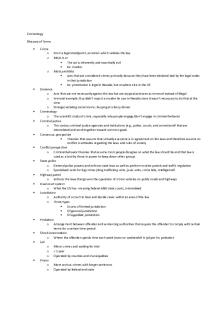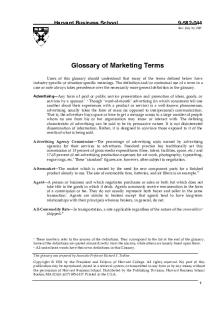Economics Notes & Glossary PDF

| Title | Economics Notes & Glossary |
|---|---|
| Author | Nadiah Mnor |
| Course | Law, Economics and Management |
| Institution | University of the West of England |
| Pages | 5 |
| File Size | 227.3 KB |
| File Type | |
| Total Downloads | 27 |
| Total Views | 129 |
Summary
Definitions of key terms and notes based on lectures and textbooks in Economics...
Description
ECONO Opportunity Costs - The value of the alternative forgone by choosing a particular activity Classical economics - Markets function best without government interference Neo-classical economics - Governments are involved to increase output & employment Microeconomics - Study of individual decision-making by both individuals & firms Macroeconomics - Study of economy-wide phenomena resulting from group decisionmaking in entire markets Economic Contribution - The gross changes in a region’s existing economy that can be attributed to a given industry Normal Profit - Minimum level of profit needed for a company to remain competitive in a market Economic Profit - Difference between the revenue received from sale of output and normal profit of input used
Free Market Economy - Prices are determined by unrestricted competition between privately-owned businesses without government intervention - Free enterprise – Producers/Consumers have complete freedom of choice over range of products bought & sold - Encourages efficiency Centrally Planned Economy (Command Economy) - Production, investment, prices & incomes are determined centrally by the government - Promotes equity
Law of Demand - As the price of good decreases, the quantity demanded will increase
Law of Supply
ECONO -
As the price of good increases, the quantity supplied will increase
Equilibrium Price - The price at which the quantity demanded and supplied are equal Public Sector - organizations that are owned and operated by the government and exist to provide services/public goods for its citizens and do not seek to generate a profit. - Money raised from taxation Public Expenditure - Capital investments & output of goods and services by central government, local authorities & nationalised industries & corporations. Public Goods - Goods for which the principles of exclusion and rivalry do not apply, & can be jointly consumed by many individuals simultaneously, at no additional cost - Inability to exclude free-riders - Eg: Lighthouses, Streetlights Merit Goods - Goods and services that the government feels that people will under-consume, and subsidised or provided free at the point of use to other organizations - Eg: Education, Health care Private Sector - Part of the economy that is run by private individuals and companies for profit and is not state controlled - Money raised from shareholders and retained earnings Partnering: 1. Project Partnering - Client & contractor work on an individual project 2. Strategic Partnering - Client & contractor work on a series of projects 3. Integrated Project Delivery - A contractual agreement between a client, design professional & contractor 4. Private Finance Initiative (PFI)
ECONO -
A form of procurement to encourage private investment in public sector projects. Eg: Hospitals, Schools, Highways
Market Failure - A marketplace where the unrestricted price system causes too few/too many resources to be allocated to a specific economic activity. - Inefficient allocation of economic resources by the private sector Negative externalities - Spillover effects where some costs of market transactions are passed to third parties - Eg: Pollution, Loss of public amenity, Loss of green space - Taxes & levy introduced
Positive externalities - Spillover effects where some of the benefits of a market transaction are passed to third parties - Eg: Job opportunities, Education (Private benefit), Walking (Reduce congestion & pollutio - Incentives & subsidies introduced
Externalities - The benefits or costs that are experien immediate seller and buyer in a transa Free-Rider - Non-paying parties cannot easily be excluded from the benefits of a good or service - Eg: Paving, Roads, Drainage Asymmetric Information - A situation in which some of the parties involved in an economic transaction have more information than others - Policies & regulation introduced
Environmental Accounting
ECONO 1. Contingent Valuation - Uses surveys to establish the hypothetical cost of environmental gain/loss 2. Travel Cost - Monetary value determined by costs of getting to the environmental asset 3. Hedonic Pricing - Places value on environmental asset using an implicit market value
Government Taxes/Levy & Regulation 1. Aggregates Levy - Tax applied to the cost of rock, sand and gravel - Reduces demand & encourages recycling 2. Landfill Tax - Tax applied to the cost of disposing of waste materials from site 3. Building Regulations - Set min. standards for the design and construction of buildings to ensure the safety and health for people in or about those buildings
Planning Gain 1. Section 106 - Negotiation between Local Planning Authority & developer to seek planning permission - Local community, public facilities & infrastructures are closely related to the project - Eg: Social housing 2. Community Infrastructure Levy (CIL) - Charge which can be levied by local authorities on new development in their area - A fixed rate paid by developer to the local authority for new infrastructure - No negotiation Price Stability Consumer Price Index (CPI) - Changing cost of a basket of goods & services of fixed composition, quantity & quality Retail Price Index (RPI)
ECONO -
Changing cost of a representative sample of retail goods & services
Gross Domestic Product (GDP) - Measure of the total monetary value of goods & services provided in a country in one year. Government Policy 1. Fiscal Policy - state purse - A combination of government spending and taxation used to achieve macroeconomic management. - Eg: VAT, Income Tax, Stamp Duty, Landfill Tax 2. Monetary Policy - Management of money supply & interest rates in an economy by a central bank
Quantitative Easing = central bank purchases government securities from the market in order to increase the money supply and encourage lending and investment
3. Direct Policy - A government legislative measure established to secure a specific government objective - Eg: Building Regulations, H&S Regulations, Section 106...
Similar Free PDFs

Economics Notes & Glossary
- 5 Pages

Glossary
- 2 Pages

Glossary
- 2 Pages

Economics Notes
- 17 Pages

Economics Notes
- 106 Pages

Economics notes
- 84 Pages

Economics notes
- 23 Pages

Glossary 303 - Lecture notes ALL
- 6 Pages

Criminology glossary
- 5 Pages

Psychology glossary
- 64 Pages

ATS1310 Glossary
- 1 Pages

MKT Glossary
- 24 Pages

Basic Economics Notes
- 23 Pages

Second Year Economics Notes
- 193 Pages
Popular Institutions
- Tinajero National High School - Annex
- Politeknik Caltex Riau
- Yokohama City University
- SGT University
- University of Al-Qadisiyah
- Divine Word College of Vigan
- Techniek College Rotterdam
- Universidade de Santiago
- Universiti Teknologi MARA Cawangan Johor Kampus Pasir Gudang
- Poltekkes Kemenkes Yogyakarta
- Baguio City National High School
- Colegio san marcos
- preparatoria uno
- Centro de Bachillerato Tecnológico Industrial y de Servicios No. 107
- Dalian Maritime University
- Quang Trung Secondary School
- Colegio Tecnológico en Informática
- Corporación Regional de Educación Superior
- Grupo CEDVA
- Dar Al Uloom University
- Centro de Estudios Preuniversitarios de la Universidad Nacional de Ingeniería
- 上智大学
- Aakash International School, Nuna Majara
- San Felipe Neri Catholic School
- Kang Chiao International School - New Taipei City
- Misamis Occidental National High School
- Institución Educativa Escuela Normal Juan Ladrilleros
- Kolehiyo ng Pantukan
- Batanes State College
- Instituto Continental
- Sekolah Menengah Kejuruan Kesehatan Kaltara (Tarakan)
- Colegio de La Inmaculada Concepcion - Cebu

